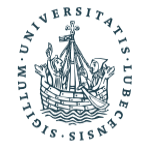Detailed introduction of the University of Lübeck:
Introduction
The University of Lübeck is a national research university in Lübeck, Schleswig-Holstein, Germany. It features medicine, and its teaching and research fields are mainly concentrated in medicine and medical applied sciences. Its subject range also covers natural sciences, technology, etc., and it excels in disciplines such as medicine, computer science and molecular life sciences.
Overview
Number of students and faculty: There are about 4,945 students, 2,154 academic staff and 310 administrative staff in the winter semester of 2018/19.
Subject areas: including medicine, natural sciences, technology, psychology, etc., providing medical professional degrees and doctoral degrees, as well as bachelor's, master's and doctoral degrees in science and engineering disciplines.
History and establishment time
Founded in 1964 In 1995, it was originally the second medical department of Kiel University, and later gradually developed into a comprehensive university.
School Strength
Teaching Strength: The curriculum is comprehensive, covering undergraduate, master and doctoral courses, focusing on interdisciplinary education and practical ability training, allowing students to accumulate practical experience in the learning process and improve their ability to solve practical problems. For example, medical students can practice in the university's outpatient center and affiliated hospitals.
Scientific Research Strength: The school has achieved fruitful scientific research results and is at the leading level in Germany in the fields of medicine, computer science and molecular life sciences. In 2006, 2009 and 2016, the school was ranked first in the medical field in Germany, Austria and Switzerland by CHE Hochschulranking; in 2009, computer science and molecular life sciences ranked second in the evaluation. The school has a number of scientific research institutions and research centers, such as the "Brain, Behavior and Metabolism Center" established in 2016, which provides a good platform for scientific research.
Nature of the institution
Public university.
Educational philosophy
Emphasis on "living in focus", focusing on cultivating students' professional qualities and in-depth research capabilities in specific fields, encouraging students to focus on learning and exploring core disciplines such as medicine and life sciences, and advocating interdisciplinary exchanges and cooperation to cultivate professionals with innovative spirit and comprehensive qualities.
Key laboratories and disciplines
Key disciplines: Medicine is the school's iconic discipline, which has a high reputation and influence in Germany and even Europe. In addition, computer science, molecular life sciences, computational life sciences, medical engineering and other disciplines have also developed rapidly and become the school's advantageous disciplines.
Key Laboratory: "Brain, Behavior and Metabolism Center" is one of the school's important scientific research institutions, providing laboratory space and offices for 33 scientific research teams engaged in cross-disciplinary research in biomedicine and neuroscience, promoting cutting-edge research in related fields.
Department Settings
There are Department of Medicine and Department of Technology - Natural Sciences, including human medicine, information technology, molecular life sciences, computer life sciences, medical engineering and other majors. In 2013, a Department of Psychology was added.
Ranking
Ranked 601-700 in the 2023 Academic Ranking of World Universities by Soft Science, and 37-40 in Germany. Its biology, human biology, medical technology, clinical medicine and other disciplines perform well in the world university subject rankings, ranking in the 151-200, 201-300, 201-300, and 301-400 ranges respectively.
Fees
As a public university, the University of Lübeck does not charge tuition for most majors, but students need to pay a semester contribution fee.
Campus
Location: Located in Lübeck, Schleswig-Holstein, northern Germany, the city is one of the famous Hanseatic cities in history, with rich historical and cultural heritage and beautiful natural scenery. In 1987, "Hanseatic City Lübeck" was listed as a World Cultural Heritage by UNESCO.
Campus Facilities: The campus has modern teaching facilities and scientific research equipment, such as libraries, laboratories, computer centers, etc. The school's outpatient center provides students with a wealth of internship and research opportunities, and also provides high-quality medical services to local residents.
Campus Culture: Campus life is rich and colorful. The school often holds various academic lectures, cultural activities, art exhibitions and sports competitions, such as summer music festivals and Christmas markets, providing students with a broad platform for communication and development.
-

Heidelberg University
-

University of Freiburg
-

University of Jena
-

University of Marburg
-

University of Rostock
-

University of Halle-Wittenberg
-

University of Bayreuth
-

Leipzig University
-

University of Tübingen
-

Humboldt University of Berlin
-

Mesoamerican University
-

Istmo University
-

Mariano Galvez University of Guatemala
-

Regional University of Guatemala
-

Galileo University
-

Francisco Marroquín University
-

Rafael Landívar University
-

University of the Valley of Guatemala
-

University of San Carlos of Guatemala
-

Technological Institute of Tlaxcala Plateau
-

Golfo University
-

Technological University of South Sonora
-

Technological University of Huejotzingo
-

Tizimín Institute of Technology
-

Chilpancingo Institute of Technology

